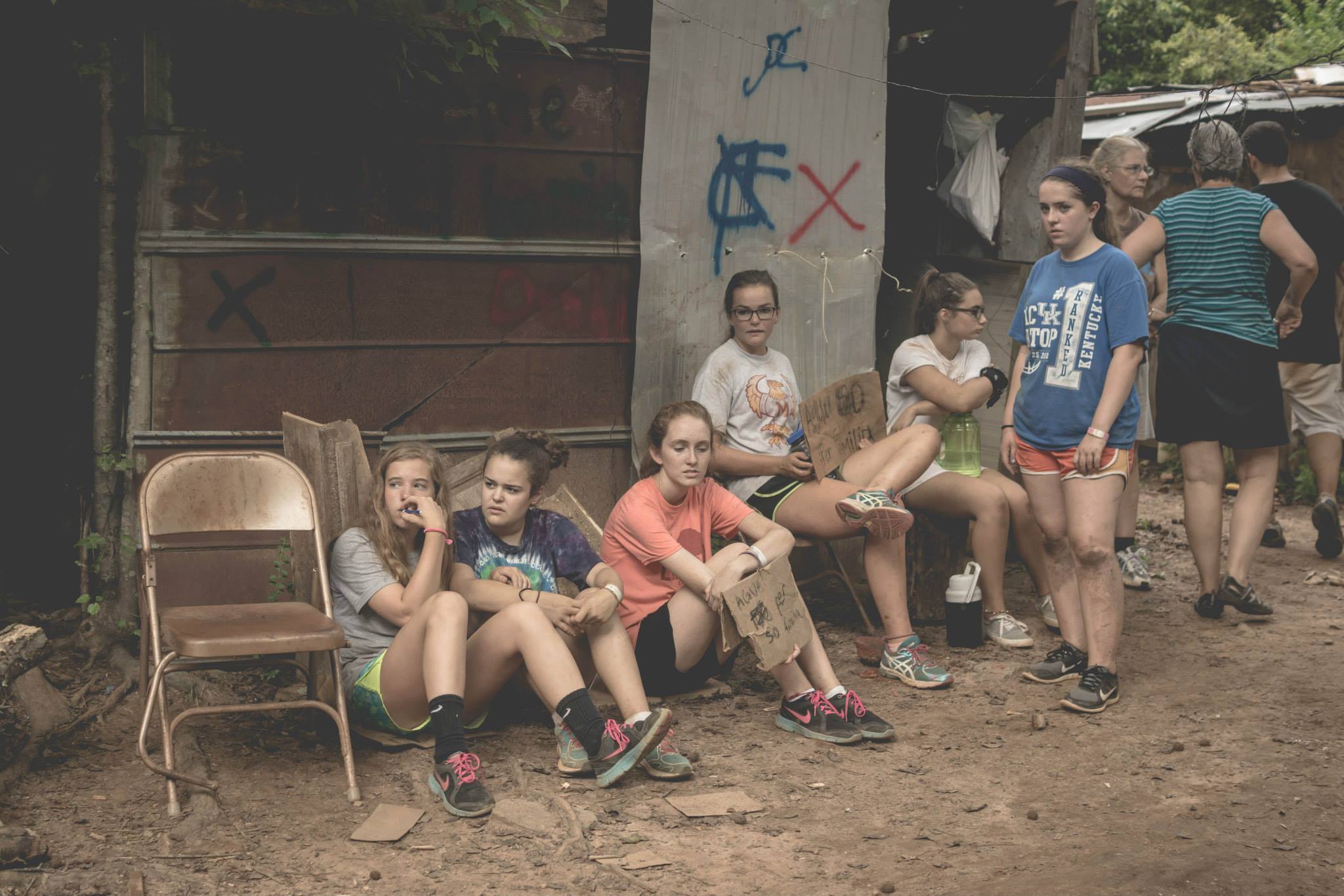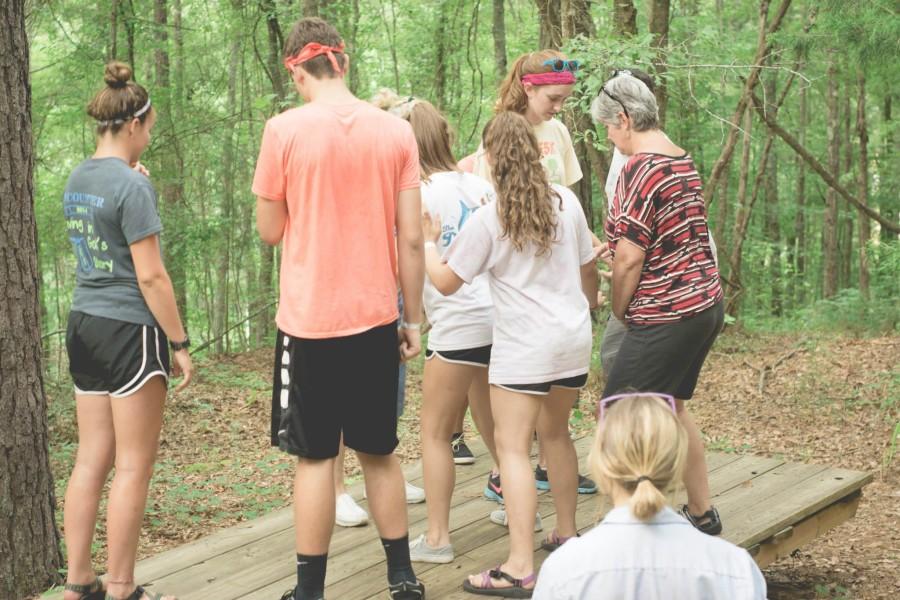Your donation will support the student journalists of Hagerty High School. We are an ad-free publication, and your contribution helps us publish six issues of the BluePrint and cover our annual website hosting costs. Thank you so much!
Summer of growth
Feet dragging from exhaustion, junior Megan McKeel goes door to door in the slums of Guayaquil, Ecuador begging for work. Begging for work, scavenging for food and hiking through forest were all part of her third-world simulation experience.
McKeel spent one week of her summer participating in a religious retreat at Servants in Faith and Technology in Lineville, Ala.
SIFAT teaches its campers how to use appropriate technology globally while strengthening their religious beliefs. They also offer a third-world simulation through a Global Village and Slum Experience. This third-world simulation is what McKeel, along with nine student members and three adult leaders of her church, University Carillon United Methodist, participated in.
After meeting with all the participants at Epic, the student ministry, at 5 a.m., they drove the 10-hours up to SIFAT. They then met up with the other attendants from the different churches at the lodge where everyone were then randomly split up into family groups.
McKeel’s ‘family’ of 11 included two members from her church and nine people she had never met. Over the upcoming week her family would participate in all activities and events together.
The night they arrived, the group proceeded to the Challenge Course to work on building trust and teamwork through balancing activities and rope courses before returning to the lodge for dinner and then the Quonset hut for worship and the first message.
The next morning, Monday, McKeel was handed a potato sack and told to fill it with only what they needed to survive before setting off in their families on a hike.
At the end of the hike, they began the simulation part of the week by a customs experience which was assisted by actors who stayed in character at all times.
A man and woman yelled at them to line up: girls on one side and boys on the other without saying anything and facing forward.
“It was extremely tense because anytime someone would move just a tad, he would snap at us,” McKeel said.
At the direction of the man, McKeel walked down the path with a couple of other girls she was with to a truck with another woman standing outside of it. This woman told McKeel and the other girls she was with to dump out their bags on the ground and she then took away any items that she felt were not a necessity. McKeel was left with the bare minimum of just her sleeping bag and flashlight.
“It was shocking to think that customs are actually like that in other places of the world,” McKeel said.
At the end of the path, they arrived in the Global Village where each family was assigned their country, with McKeel’s being Uganda, which came with a simulated household and traditional recipes.
To make their lunch, McKeel and the other women in her family ventured off to one of the multiple gardens to collect vegetables while the men went into the surrounding woods to gather firewood to start a fire. With limited supplies and wet wood, they made a lunch of potatoes, tomatoes and rice, and they boiled water from a nearby creek for drinking water.
Although the conditions were appalling, McKeel found that the Global Village largely focused on happiness and strengthening communities.
“[Citizens of third-world countries] have a lot of time to spend with their families and grow as a community and that’s a definite blessing that they have despite the poverty and poor conditions that we lack here in America,” McKeel said.
Throughout the day, the groups learned to use cheap and plentiful materials from their surroundings. McKeel’s group, after a demonstration by one of the camp counselors, used a Sawyer Filter to get clean water and a Rocket Stove to reduce smoke emission.
For dinner, all the families gathered their country’s meals at the community ring and indulged in a global feast, allowing everyone a chance to try traditional foods from all the countries, ranging from Ecuador to Nepal.
“The Global Village, although hard work, focused a lot on happiness and community,” McKeel said.
After breakfast the next day, the Camp Director Becca Griffin went to each family and gave them an envelope with the families situations and why they were having to move to an urban area. This marked the beginning of the Slum Experience which was modeled after Guayaquil, Ecuador.
McKeel’s family was told that one of their brothers, junior Matt Mero, had a job in the slums and everyone else was unemployed. As soon as they arrived in the slums, McKeel and everyone else unemployed began to beg people for work.
“It was very frustrating looking for work in the slums as a woman because we were given much less work than the men, and often not paid after doing the work,” McKeel said.
McKeel was given work as an advertiser where she made a sign to promote the water lady. McKeel would only get paid if she was able to get a minimum of two people to buy water from her. Other jobs were anything from collecting firewood to keeping peoples fires going.
Through the collaboration of her whole family, McKeel was able to raise enough money for dinner, freshwater and a house. Their house was made of cardboard and had old, chigger-filled couches in it.
Another big aspect of the Slum Experience was being faced with the reality of ways to earn easy money through gambling, prostitution and selling family members into slavery. The women were primarily unable to walk around by themselves because of the fear of the “slumlords” kidnapping them for slavery or prostitution.
One of McKeel’s counselors was a prostitute and the other was a slumlord.
“In real life, he was the nicest guy in the world and laughed at everything, but, as the slumlord, he was terrifying,” she said.
Slaves would occasionally be taken by the lords and then thrown into a dark room. From the outside, McKeel could hear screaming and banging.
When McKeel had gone up to a hill outside of the slums to collect firewood for a job, she suddenly heard screaming and banging. Turning around, McKeel saw everyone in the slums had gone running from the slums due to a slumlord lighting the roof of a house on fire in anger. A slave of his had escaped.
“Although we knew it was a simulation, it got to feel quite real,” McKeel said. “The whole slum experience was emotionally and physically exhausting.”
One local from the slums yelled at McKeel to run to her house and hide there while the slumlords walked the empty streets, but eventually the slumlords began slamming open the doors of houses. McKeel and those accompanying her were yelled to follow the man that opened their door.
After eventually being led to the junk yard and told to sit, the actors from the slums stood in the front and began telling everyone the background behind their characters, ending the Slum Experience.
Tearful goodbyes shared between families closed out the retreat for McKeel as they began the drive back home.
“I grabbed their phone numbers so that I can still keep contact with a couple people because we all grew incredibly close,” she said.
McKeel, through SIFAT as well as other camps and retreats she attended, returned motivated to make a change in her church as well as a community.
“I have gained a stronger appreciation of everything in my life and now I just want to help out in any way I can,” she said.
At her church, McKeel took on a more active role by volunteering in the adult service, Vessel, as well as helping lead youth programs such as Venture during services.
In addition, McKeel put together a plan of starting a garden at UCUMC as a way of giving back to the local community. It would be modeled after the Global Village and any food grown as well as any profits gained from selling the seeds of the fruits and vegetables would then be donated to local food banks.
McKeel also plans to attend SIFAT again in future years if time allows due to what she gained from the experience.
“It gave me an appreciation for the little things in life and I’ve gained a stronger love of nature,” McKeel said.


